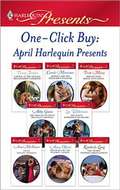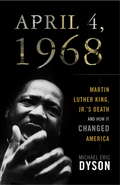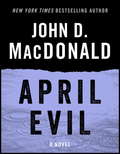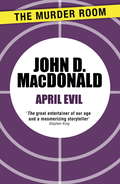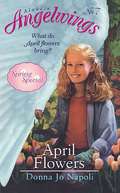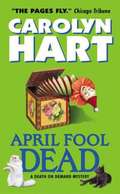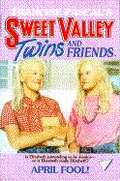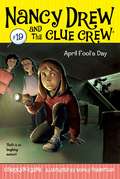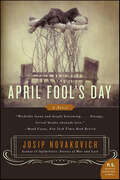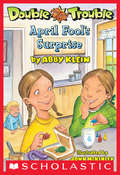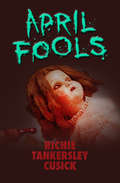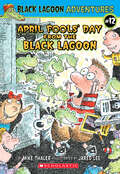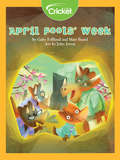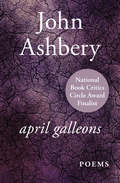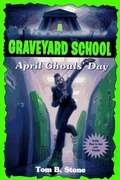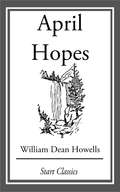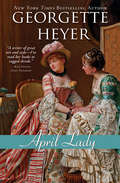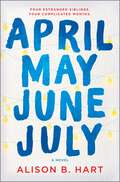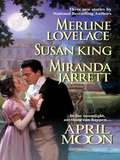- Table View
- List View
April 1998 World Economic Outlook
by International Monetary FundA report from the International Monetary Fund.
April 2009 Harlequin Presents
by Penny Jordan Anne Mcallister Trish Morey Carole Mortimer Abby Green Lee WilkinsonA French tycoon determined to break down a conservative journalist's inhibitions... A poor woman swept into the luxurious world of a Sicilian tycoon following a case of mistaken identity... An actress forced to share a villa with the man who broke her heart years ago... Read the passionate love stories of these characters and more in eight irresistible books from Harlequin Presents! Bundle includes Captive At The Sicilian Billionaire's Command by Penny Jordan, Bedded for the Spaniard's Pleasure by Carole Mortimer, Forced Wife, Royal LoveChild by Trish Morey, The French Tycoon's Pregnant Mistress by Abby Green, The Boss's Forbidden Secretary by Lee Wilkinson, Savas' Defiant Mistress by Anne McAllister, Pregnant by the Playboy Tycoon by Anne Oliver, and The Secret Mistress Arrangement Kimberly Lang.
April 4, 1968: Martin Luther King Jr.'s Death and How It Changed America
by DysonOn April 4, 1968, at 6:01 p. m. , while he was standing on a balcony at a Memphis hotel, Martin Luther King Jr. was shot and fatally wounded. Only hours earlier King ended his final speech with the words, "I may not get there with you, but I want you to know tonight, that we as a people will get to the Promised Land. ” Acclaimed public intellectual and best-selling author Michael Eric Dyson examines how King fought, and faced, his own death, and how America can draw on his legacy in the twenty-first century. April 4, 1968 celebrates the leadership of Dr. King, and challenges America to renew its commitment to his vision.
April Evil
by John D. MacdonaldApril Evil, one of many classic novels from crime writer John D. MacDonald, the beloved author of Cape Fear and the Travis McGee series, is now available as an eBook. Springtime in Florida. The vacation season is over. It's a hot day . . . too hot for April. The sun beats relentlessly down on the sidewalks. Most of the tourists have gone back north, and the residents of Flamingo have the town pretty much to themselves. They can play golf on empty courses, relax on pristine beaches. Kids can play hide-and-seek in the tall grass around the vacant winter houses. The real estate men, the car salesmen, and the police can all relax. But at 11:30 this morning, a man and a woman in a dusty gray Buick with Illinois plates drive into town. And they're about to hit like a hurricane. The evil days have begun. Features a new Introduction by Dean Koontz Praise for John D. MacDonald "The great entertainer of our age, and a mesmerizing storyteller."--Stephen King "My favorite novelist of all time."--Dean Koontz "To diggers a thousand years from now, the works of John D. MacDonald would be a treasure on the order of the tomb of Tutankhamen."--Kurt Vonnegut "A master storyteller, a masterful suspense writer . . . John D. MacDonald is a shining example for all of us in the field. Talk about the best."--Mary Higgins Clark
April Evil
by John D. MacdonaldThe stage was set. Harry Mullin had hit town first. But he had just made the FBI's Ten Most Wanted list, and he was a little nervous about being seen. With him at the rented house where they planned to case the job was a girl named Sal. Then the Ace turned up. He'd been good in his day but had lost something in the guts department. But the last one in town was Ronnie. Ronnie had killed 12 men and two women in seven years and had gotten to like his job - maybe a little too much . . .
April Evil (Murder Room #62)
by John D. MacDonaldThe stage was set. Harry Mullin had hit town first. But he had just made the FBI's Ten Most Wanted list, and he was a little nervous about being seen. With him at the rented house where they planned to case the job was a girl named Sal. Then the Ace turned up. He'd been good in his day but had lost something in the guts department. But the last one in town was Ronnie. Ronnie had killed 12 men and two women in seven years and had gotten to like his job - maybe a little too much ...
April Flowers
by Donna Jo Napoli Lauren Klementz-Harte Doron Ben-AmiThe Little Angel of Understanding gets along with everyone -- except for the Little Angel of Learning. He uses big words, and the little angel doesn't always know what they mean. Will the Little Angel of Understanding be able to earn his wings if there are still some words he can't figure out? He'll have to help Maggie with her problem first. Maggie loves it when her grandmother comes for a visit. But this trip is different, because Gram isn't just visiting. She's going to move in with Maggie's family -- forever. Can the Little Angel of Understanding help Maggie make room for Gram?
April Fool Dead
by Carolyn HartSomeone is playing a rather nasty April Fool's prank on mystery bookstore owner Annie Darling. A felonious forger on the idyllic -- if rarely tranquil -- South Carolina island of Broward's Rock has made it appear as if Annie is accusing some of her neighbors of murder. In the wink of a bloodshot eye, the Darling name is mud . . . and then the Broward's Rock body count starts mysteriously increasing. And now it's up to Annie to follow the well-hidden trail of the vicious trickster -- or a secret slayer's next lethal "joke" may very well be on her!
April Fool! (Sweet Valley Twins #28)
by Jamie Suzanne Francine PascalIt is April Fools Day in Sweet Valley and Jessica has planned her biggest trick ever. Things go wrong for Elizabeth, but not Jessica. The Home Ec Class makes Suffles and Elizabeth gets a C ... then she gets a detention!
April Fool's Day (Nancy Drew and the Clue Crew #19)
by Carolyn Keene Macky PamintuanNancy, George, and Bess have been invited to an April Fool's Day party at their new schoolmate's house. It sounds like it's going to be a lot of fun -- each guest is bringing a gag to the party, and the best prank will win a special prize. <P><P> When two of the guests' fancy new electronics go missing, Nancy knows something's up. Is this someone's idea of a joke? The Clue Crew certainly isn't laughing, and they're on the case to find the missing gadgets.
April Fool's Day: A Novel
by Josip NovakovichIvan Dolinar is born in Tito's Yugoslavia on April Fool's Day, 1948 -- the auspicious beginning of a life that will be derailed by backfiring good intentions in a world of propaganda and paranoia. At age nineteen, an innocent prank cuts the young Croatian's budding medical career short and lands him in a notorious labor camp. Released on the eve of civil war, Ivan is drafted into the wrong army, becoming a pawn in an absurd conflict in which the rules and loyalties shift abruptly and without warning. But even in a world gone mad, one course of action remains eminently sane: survival.Told with bitingly dark humor and a deep tenderness, April Fool's Day is both a devastating political satire and a razor-sharp parody of war.
April Fool's Surprise: April Fool's Surprise (Double Trouble Ser. #2)
by Abby KleinLook out, second grade -- here comes trouble!Twin sisters Kelly and Kasey are always getting into some kind of trouble. So of course April Fool's is their favorite holiday! This year the twins have plans to fool everyone, all day long -- including the ultimate trick. This year, Kelly and Kasey are pulling a twin switcheroo! But can they fool the whole second grade?
April Foolishness
by Teresa Bateman Nadine Bernard WestcottIt's a spring morning on the farm. Grandpa is fixing breakfast for his visiting grandkids. Suddenly his grandson reports that the cows have got loose! He thinks Big Brown Bessie just stepped on a goose! But Grandpa isn't at all upset at this news- he just pours himself a glass of milk! Why is Grandpa so cool? Because he knows the kids are trying to play an April Fool's trick! And then Grandma steps in with a trick of her own.
April Foolishness
by Teresa Bateman Nadine Bernard WestcottIt's a spring morning on the farm. Grandma is happy the grandkids are visiting--they've picked just the right day!--and Grandpa is fixing breakfast. Suddenly his grandson reports that the cows have got loose! He thinks Big Brown Bessie just stepped on a goose! "Good gracious," Grandpa says as he pours himself a glass of milk. When his granddaughter shouts the chickens are out, Grandpa cooks up some eggs. "Pigs broke the gate." Grandpa fries bacon. Why is Grandpa so cool? Because he knows the kids are trying to play an April Fool's trick! Teresa Bateman's rollicking rhyme and Nadine Bernard Westcott's rib-tickling pictures make for riotous April Fool's Day fun. The author lives in Washington State. The illustrator lives in Massachusetts.
April Fools
by Richie Tankersley CusickRevenge is no jokeOn their way home from an April Fools&’ party, Belinda and her friends mistakenly cause a horrible accident. Fearing they&’ll be on the hook for murder, they flee the scene and vow to keep silent. But weeks later, Belinda&’s conscience won&’t give her any peace—and neither will the mysterious person who is terrorizing her with cruel pranks. After enduring a series of sickening jokes, Belinda fears that she and her friends aren&’t the only ones who know their secret—and that these pranks may be a deadly warning in disguise.This ebook features an illustrated biography of Richie Tankersley Cusick including rare photos and never-before-seen documents from the author&’s personal collection.
April Fools' Day from the Black Lagoon (Black Lagoon Adventures #12)
by Mike ThalerThese fun-filled chapter books mix school, monsters, and common kid problems with hilarious results. You'll scream with laughter!It's the end of March, and Hubie is struggling to prepare his pranks for the big day. The whoopee cushion, the rubber tarantula, and the fly in the ice cube just aren't good enough anymore--not when the worst joke comes from the place he least expects it. Will Hubie play the fool on this day?
April Fools' Week
by Gaby FeBlandMeet the many generations of the great Dinostein Pranksters! In this family, April Fools' lasts a whole week. It's a tradition that dates back to the Jurassic Period. But little Joelle maybe the best prankster yet!
April Galleons: Poems
by John AshberyIn Ashbery&’s 1987 collection, ballads, folklore, and fairy tales mesh with the anxieties and idioms of modern lifeFor a book by one of the leading avant-garde poets of modern literature, John Ashbery&’s April Galleons is suffused with voices from the past. There are echoes of the Romantics in the elegiac &“A Mood of Quiet Beauty&” and &“Vetiver,&” allusions to ballads and folkloric epics in &“Finnish Rhapsody&” and &“Forgotten Song,&” and veiled references to legends, folk songs, and fairy tales. But as always with Ashbery, the modern world is the microphone through which these past voices are made to speak, amplified and invigorated by Ashbery&’s signature wit and generosity of spirit. A finalist for the National Book Critics Circle Award in the year in which it was first published, April Galleons is a must-read collection from a notable period in John Ashbery&’s long and lauded career.
April Ghouls' Day (Graveyard School #11)
by Tom B. StoneINVASION OF THE BODY SNATCHERS! Maria Medina's not quite sure how it happened. One minute she was just another student at Graveyard School, trying to make it through the first day of April. Then suddenly someone--somehow--set her up in a gruesome body switch. Now the principal, Dr. Morthouse, is acting really weird--but not as strange as Maria. Body, body, who's got whose body? On April Fools' Day, no one is safe at Graveyard School. You'll be dying to go to class at GRAVEYARD SCHOOL Bookshare's library has: #1 Don't Eat the Mystery Meat! #2 The Skeleton on the Skateboard, #3 The Headless Bicycle Rider, #4 Little Pet Werewolf, #5 Revenge of the Dinosaurs, #6 Camp Dracula, #7 Slime Lake, #8 Let's Scare the Teacher to Death, #9 The Abominable Snow Man, #10 There's a Ghost in the Boy's Bathroom and #12 Scream, Team.
April Gold (Grace Livingston Hill #27)
by Grace Livingston HillMarilla Reed had spent her whole life in the warm comfort of a well-to-do household. Then, suddenly, her entire family was plunged into poverty. From the depths of desperation, Marilla found the satisfaction of fending for herself. And the infinite joys of falling in love. Grace Livingston Hill has created thrilling stories of inspiring wholesome people whose ardent faith and overflowing hearts cope triumphantly with the problems of the modern world. Bookshare has nearly all of her 100 books as well as her biography written by her son in law.
April Hopes
by William Dean HowellsFrom his place on the floor of the Hemenway Gymnasium Mr. Elbridge G. Mavering looked on at the Class Day gaiety with the advantage which his stature, gave him over most people there. Hundreds of these were pretty girls, in a great variety of charming costumes, such as the eclecticism of modern fashion permits, and all sorts of ingenious compro-mises between walking dress and ball dress. It struck him that the young men on whose arms they hung, in promenading around the long oval within the crowd of stationary spectators, were very much younger than students used to be, whether they wore the dress-coats of the Seniors or the cut-away of the Juniors and Sophomores; and the young girls themselves did not look so old as he remembered them in his day. There was a band playing somewhere, and the galleries were well filled with spectators seated at their ease, and intent on the party-coloured turmoil of the floor, where from time to time the younger promenaders broke away from the ranks into a waltz, and after some turns drifted back, smiling and controlling their quick breath, and resumed their promenade. The place was intensely light, in the candour of a summer day which had no reserves; and the brilliancy was not broken by the simple decorations. Ropes of wild laurel twisted up the pine posts of the aisles, and swung in festoons overhead; masses of tropical plants in pots were set along between the posts on one side of the room; and on the other were the lunch tables, where a great many people were standing about, eating chicken and salmon salads, or strawberries and ice-cream, and drinking claret-cup.
April Lady
by Georgette Heyer"Graceful and exciting ... the best kind of 'escape' story." --LIBRARY JOURNAL What seems a marriage of convenience... When young newlywed Lady Nell Cardross begins to fill her days with fashion and frivolity, the earl has to wonder whether she really did marry him for his money, as his family so helpfully suggests. And now Nell doesn't dare tell him the truth ... Is getting trickier all the time...He thought he was marrying for love, but between his concern over his wife's spending sprees, rescuing her impulsive brother from one scrape after another, and attempting to prevent his own half sister from a disastrous elopement, it's no wonder the much-tried earl can't see where he's gone wrong ... "Georgette Heyer has done it again ... It's the sheer fun of reading on a high entertainment level. For such an experience, April Lady is tops. It's downright delicious." --CHICAGO SUNDAY TRIBUNEthe Queen of Regency romance, and was legendary for her research, historical accuracy, and her extraordinary plots and characterizations.
April May June July: A Novel
by Alison B. HartA triumphant family story and sharply observed exploration of privilege, identity, and love in all its forms, following four estranged siblings whose lives collide in the lead-up to a family wedding, when new clues surface about their long-missing father&“Truly a great American novel that does the very best of what fiction can do: sink us into other people&’s lives, show us new worlds, make our hearts pound and our breath catch. Superb.&” —Julia PhillipsApril, May, June, and July Barber don&’t have much in common anymore. An upcoming family wedding will place the four siblings in the same room for the first time in years. But shortly before, when April spots their father, who went missing while serving overseas a decade ago, their reunion becomes entirely more complicated.While the siblings&’ search for the truth about their father forces them back into each other&’s lives, it also intensifies their private dramas. April loves her husband, but seeks excitement outside their marriage. May had big dreams for the future, but she&’s still stuck living at home. June is eager to marry her girlfriend, so why does she need a drink at every wedding-related event? And then there&’s baby brother July, whose unrequited love for his straight roommate has him more confused than ever.Confronting the past together, April, May, June, and July will find not only answers about their father, but new romance, hope, and understanding as they learn to embrace the beauty of their shared history.
April Moon
by Miranda Jarrett Merline Lovelace Susan KingSAILOR'S MOON by Merline LovelaceWhile traveling to her unwanted wedding to a brutal nobleman, the notorious Lady Elizabeth Stanton was taken captive by Captain Richard Blake, an all-too-appealing American with vengeance on his mind! But the trouble was that Elizabeth soon wanted nothing more than to stay his prisoner....WHITE FIRE by Susan KingOn a moonlit Scottish coast, Jenny Colvin searched for proof to halt her rogue father's hanging. Stopped by the mysterious and brooding Sir Simon Lockhart, she begged for his help, aware that only this once daring smuggler could save her father from the gallows.THE DEVIL'S OWN MOON by Miranda JarrettOn a madcap wager, Harry, the fast-living Earl of Atherwall, assumed the guise of a reckless highwayman and unknowingly ordered Sophie Potts, his lost love, to stand and deliver. When Sophie refused, Harry had no choice but to kidnap her instead!

